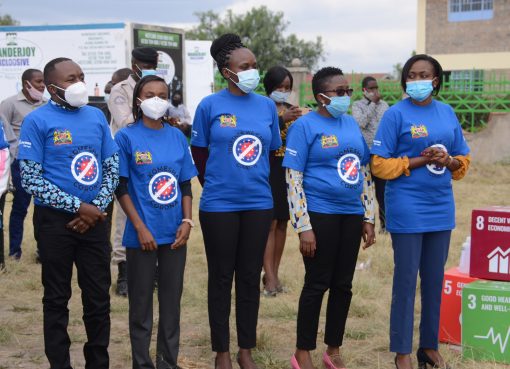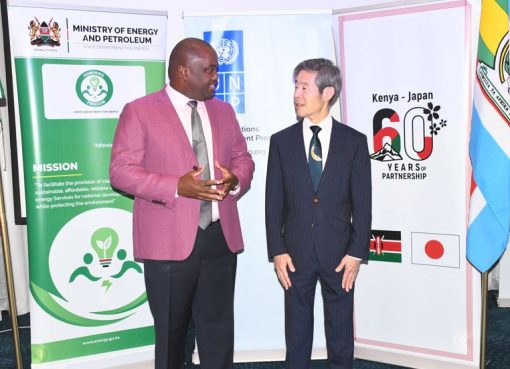The Ministry of Tourism and Wildlife is revamping research and training in wildlife so that any policies made about this crucial sector are informed by scientific research which will result in better management of the sector.
The Ministry Cabinet Secretary (CS) Ms. Rebecca Wanjiku Miano said the Revised Wildlife Strategic Plan 2023-2027 is a great milestone that will help in addressing issues in the wildlife sector.
“With proper research, we will be able to plan ahead especially in projecting future growth of our wildlife species, especially for the rare species and establish why they are becoming extinct and find solutions,” Miano said.
She was speaking at the Wildlife Reserach and Training Institute (WRTI) in Naivasha on Wednesday during the launch of the revised institute Strategic Plan (2023 -2027). The plan seeks to entrench the use of scientific research to promote sustainable wildlife conservation and address the numerous challenges facing the sector including droughts, flooding, and reduced wildlife populations.
The CS said this launch comes just weeks after the Kenya Wildlife Service (KWS) launched theirs and the Ministry is ready to implement them and going forward, capacity building for the sector will be prioritized in order to meet its agenda of wildlife conservation.
“To this end, we have rolled out training and new curriculum for the period 2024 to 2033, guided to improve the strategic plan by providing better information, ideas and agenda among other benefits,” Miano stated.
She also observed that one of the goals in the reviewed Strategic plan is providing leadership and coordination in wildlife research and provision of scientific data and information. Under this goal, clear strategies aimed at bridging the science-management and policy link have been put in place.
These, she said include periodic synthesis and drafting of policy briefs and management reports to ensure wildlife and their habitats are sustainably conserved and managed through evidence-based decision-making processes as envisaged in the National Wildlife Strategy 2030.
“This agenda aims to refocus wildlife research in the country to ensure it is responsive to the needs of the country,” the CS noted.
She was full of praise for the Strategic Plan in particular, saying it has well thought out strategies aimed at providing scientific data and information in addressing emerging challenges in the wildlife sector such as the institute seeking partnerships to enhance research in climate change and carbon financing opportunities.
Further, the revised strategic plan will develop forensic tools and techniques to aid in prosecution of wildlife crimes, establish invasive species status and methods of control, establish restoration initiatives of degraded wildlife habitats, research on socio-economic and human dimensions on wildlife resource management, identify and pilot nature-based mitigation strategies on human–wildlife co-existence, and establishing drivers of bush meat off-take among others.
The CS further added that the strategy will enable Kenya to uphold its commitment to international wildlife protocols and conventions, reinforcing our leadership in global conservation efforts, as clear strategies have been included in the reviewed Strategic Plan to implement the agenda.
To this end, Miano sought to assure the WRTI Institute of the full support of her Ministry together with her partners in the implementation process and called upon on development partners to join Government in meeting the financial gap.
The Principal Secretary (PS) in the State Department of Wildlife Ms. Silvia Museiya Kihoro on her part noted that there was a worrying trend where the country is losing small wildlife species such as Roan antelope in Ruma National Park and called for concerted efforts in reversing this trend.
She raised concerns over the rising cases of bush meat within the national wildlife corridors and noted that the strategic plan 2023-2027 will go a long way in addressing these challenges among other hurdles facing the Wildlife sector.
The WRTI Chief Executive Officer (CEO) and Director Dr. Patrick Omondi revealed that the implementation of the strategic plan requires sh. 13Billion for the next four years of its implementation and added that the institute mapped key priority projects that will be addressed through the implementation of the plan.
Dr. Omondi further disclosed that through the ongoing National Wildlife Census that will end in June 2025, the country will know the status of the wildlife population and challenges facing them, including issues of climate change and the threat of extinction of some speciesHe said so far, they had received an allocation of sh. 130 million h for the national census exercise that is now moving to the Samburu, Laikipia, Marsabit and then to Northern Kenyan before wrapping up in the Tsavos. He expressed optimism that the balance of Sh. 40million will be availed to complete the exercise.
“The strategic plan we are launching today is a culmination of the revision of the first Strategic Plan 2022-2027,” the WRTI CEO stated. The plan will also avail data to wildlife researchers and policymakers through a harmonized Research portal.
In reviewing the first Strategic Plan, the Institute which is still in its formative years having started operating from 1st July 2021, was guided by three principles, namely: Enhancing its product in terms of provision of accurate scientific data and information, and skill sets and competencies in its graduates and its identity in terms of coordination of research and training, and corporate brand identity, and stakeholders’ engagement.
The Strategic Plan will also be looking at ways of resolving human wildlife, conflict connectivity, technology and climate and building strong local and international linkages for shared knowledge.
It will also resolve issues of Wildlife farming and economy to reverse bush meat menace and data generated will help inform scientific and make WRTI a globally competitive wildlife research centre.
By Mabel Keya – Shikuku




